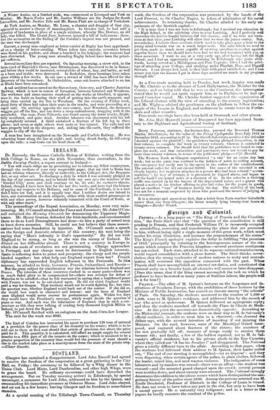IRELAND.
Dr. Kennedy, the Roman Catholic Bishop of Killaloe, writing from the Irish College in Rome, on the 25th November, thus contradicts, in the Dublin Evening Packet, a report current in Ireland-
" You will much oblige me by permitting me to inform my fellow countrymen, through the medium of your very respectable paper, that my visit to Rome has had no relation whatever, directly or indirectly, to the Colleges Act, the Bequests Act, or any other act. To discharge a duty to which I was solemnly pledged on the day of my consecration, and to behold with my own eyes the wonders of the ' Eternal City.; were, and shall continue to be, its sole, its exclusive objects. Indeed, though I have been here for the last five weeks, and have had the honour of paying my respects to his Holiness, and to some of the Cardinals, it is a fact that I have not had, and it is equally tree that I neither desire nor intend to have, any conversation on such subjects, either with those exalted personages or with any other person, however remotely connected with the Court of Rome, or with any other court."
The proceedings of the Repeal Association, on Monday, were very unin- teresting. Mr. O'Connell attacked the Times and Examiner; Mr. John O'Con- nell eulogized the Morning Chronicle for denouncing the Tipperary Magis- trates. Mr. Henry Grattan defended the Irish landlords, and recommended them to do as Lord Donoughmore had done—to hire a party of armed men to hunt down assassins. Still, he could not but believe that these assassi- nations had some foundation in injustice. Mr. O'Connell made a speech on the foreign and domestic relations of this country; his text being the saying that "Man's infirmity is God's opportunity." He did not wish England to be strong, so long as she was the enemy of Ireland. He dilated on her difficulties abroad. There is not a country in Europe in which the seeds of revolution are not germinating. Change approaches in Portugal, and any change must be detrimental to English interests. Spain is softening down to peace and prosperity, the clergy and the people banded together; but what help can England expect from her? French diplomacy has superseded English influence in the Peninsula. In like manner, he alluded to Italy, Germany, Prussia, Switzerland, and Russia— But the great subject for consideration was the relations between England and France. The interests of these countries clashed in so many parts—there was so mnch faded glory to be compensated for—there was revenge for defeat of Waterloo to be satisfied—that he felt warranted in saying that a lengthened peace with France was not to be calculated upon. He did not think England would peril a war for Oregon. That territory would not be worth fighting for; but then the question was, whether England could back out of the matter. If she did so, she would lose much in character and honour; and the fame of England once blighted would never recover its preeminence again. Within ten days they would have the President's message, which would decide the question of peace or war. And such was the infatuation of England, that in such aeon- Juncture as this they were talking of sending forty thousand English Militia to Ireland, to put down the Repeal.
Mr. O'Connell finished with an eulogium on the Anti-Corn-law League. The rent for the week was 2921.
The Earl of Caledon has instructed his agent to purchase 120 tons of oatmeal at a provision for the poorer class of his tenantry on his estate; which is to be sold out to them at first cost should that article of provision rise above the price paid for it. This quantity, it is calculated, will afford an ample supply for several months to a fifth part of all the tenants on the estate; which is assumed to be a greater proportion of the tenantry than would feel the pressure of want should a rise in the market take place or a scarcity ensue from the state of the potato crop. --Ulster Gazette.


























 Previous page
Previous page